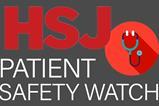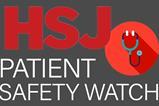HSJ is now hosting the Patient Safety Watch newsletter, written by Patient Safety Watch chief executive James Titcombe.
Good afternoon and welcome to this fortnight’s Patient Safety Watch newsletter.
Number of women dying in pregnancy at 20-year high
The latest research by MBRRACE-UK has revealed the number of women dying during pregnancy or shortly afterwards has reached its highest level in 20 years. The investigation – which was widely reported, including in The Guardian – found the maternal death rate had increased to 13.41 deaths per 100,000 pregnancies between 2020 and 2022, the highest it had been since 2003-05 and significantly up on the 8.79 per 100,000 pregnancies between 2017 and 2019.
Responding to the report, Sands chief executive Clea Harmer described the data as “very worrying and adds to the overwhelming body of evidence that improving maternity safety for all needs to be at the top of the government’s agenda.”
House of Lords to debate maternity services
With maternity safety continuing to hit the headlines, an important House of Lords debate has been scheduled for 25 January. The House of Lords Library has published a useful briefing paper, focusing on maternity safety, ahead of the debate.
Maternity safety will also be under the spotlight in the next edition of the BBC’s Panorama, Midwives under Pressure, scheduled to be aired later this month. According to the programme’s blurb: “Whistleblowers at a trust in Gloucestershire tell reporter Michael Buchanan about the deaths of mothers and babies, the dangers of understaffing and a culture that they say has failed to learn from mistakes.”
My view? While important progress has been made in recent years, concerns around maternity safety are now reported on an almost daily basis. Recently, Mumsnet has added its support for calls for a national inquiry into maternity safety, in addition to parents whose only motivation is to ensure other families don’t suffer the life-changing consequences of poor maternity care that they experienced. Now is surely the time for the government to listen and act.
In other news this edition:
Clinical negligence lawyers say they are ‘embarrassed by the law’ following landmark ruling
In a landmark decision, Supreme Court judges ruled by six to one in Paul and another v Royal Wolverhampton NHS Trust that doctors owe no duty of care to protect patients’ close family from psychiatric illness after witnessing the death or medical crisis of a relative.
Maternity lawyer Natalie Cosgrove, a partner with national firm Ashtons Legal, told the Law Society Gazette, it was a ”very sad day for claimants’, adding: ”When dads and partners feel they don’t matter – now they know the law feels the same.”
Richard Baker KC, a barrister with 7BR Chambers, added: “There have been a few times in my career when I have felt genuine embarrassment at the state of the law. This is one of them.”
Patients at risk from medication shortages
Several newspapers have reported on the currently high levels of medication shortages, including for drugs used to treat ADHD and diabetes.
The Times reported the Royal Pharmaceutical Society believed the scarcity was being caused by a combination of increased global supply, manufacturing problems and missing key ingredients. Meanwhile, Association of Independent Multiple Pharmacies chief executive Leyla Hannbeck described the situation as the worst ever seen.
She said: “Every week we get a message informing us that a particular popular medicine is going to be out of stock for a period of time… Patients are without their medicines and in some cases at risk of harm, pharmacists are out of pocket, exhausted, and yet it seems the officials refuse to see the seriousness of this situation.”
This is an issue close to home for me, as my father (who suffers from atrial fibrillation) has been unable to obtain his usual prescription of disopyramide (an antiarrhythmic) for over a month and has been in almost constant AF as a consequence.
Stretched services spark warning children not getting ‘best start in life’
The Institute of Health Visiting has published the results of its survey of health visitors, which found 79 per cent thought the service lacked the capacity to offer full support to all children with identified needs, while 80 per cent felt other services were too stretched to pick up on all onward referrals for children needing additional support.
The survey results also showed 78 per cent of health visitors had witnessed an increase in perinatal mental illness, 69 per cent had seen an increase in domestic abuse and 50 per cent reported an increase in families skipping meals in response to the cost of living crisis.
IHV CEO Alison Morton said: “Sadly, despite policy promises, more and more children are not getting the ‘best start in life’. And the situation is getting worse with more children falling behind with their development and widening health inequalities.”
Thousands of mental health patients readmitted shortly after discharge
Figures seen by The Guardian have revealed thousands of patients are being readmitted to mental health hospitals within a month of being discharged, raising concerns they may be being forced to leave prematurely.
The data, obtained by Labour MP Rosena Allin-Khan using Freedom of Information requests, revealed 3,381 patients across 35 specialist mental health trusts were readmitted within 30 days of being discharged in 2022-23.
Dr Allin-Khan said: “With record waiting lists and mental health beds in short supply, it is alarming that many patients are being discharged only to be readmitted within days… Being discharged too soon can have a disastrous impact, stunting progress towards a full recovery, ultimately causing further damage to a patient’s mental health.”
People with severe mental illness dying younger, warns report
Research published by the Centre for Mental Health has found people with severe mental illness face a life expectancy 15 to 20 years shorter than the general population, largely because of preventable or treatable physical health problems.
The report – which was written with Equally Well UK and commissioned by NHS England – said this could be addressed by ensuring everybody with a severe mental illness received an annual physical health check, but warned people currently faced barriers to accessing these. These barriers included difficulty travelling to a GP surgery because of, for example, limited mobility and distrust in healthcare professionals due to previous poor experiences.
Health secretary announces new women’s health priorities for 2024
The health and social care secretary has promised to prioritise women’s health in 2024, including menstrual problems and menopause, women’s health research and support for domestic and sexual abuse victims.
Speaking at the Women’s Health Summit in central London, Victoria Atkins added the government would also prioritise improving maternity care and support for mothers who suffer birth trauma and announced £50m research funding to tackle maternity disparities.
Sharing some good stuff…
Share your views of maternity care to help improve inspection
The Healthcare Improvement Studies Institute (THIS Institute) has announced it is leading an independent evaluation of the Care Quality Commission’s national maternity inspection programme and wants your feedback. If you are interested in maternity safety and how maternity services are regulated, this is a great opportunity to contribute. More information and how to get involved is available here.
I was really pleased to see this news, not least because THIS Institute has published brilliant work on maternity safety and in my view is the ideal organisation to lead the project.
The National Maternity Safety Conference 2024 – now available to book
The fantastic charity Baby Lifeline has announced its next National Maternity Safety Conference will be held in Birmingham on 26 September. This annual conference has built a reputation as a ‘must attend’ event for anyone interested in maternity safety improvement, bringing together delegates, speakers, and exhibitors from hundreds of organisations across the UK and further afield to facilitate collaboration and discussion between all stakeholders within maternity. More information and how to book is available here.
Two pieces on SEIPS
Deinniol Owens and Helen Vosper from the Health Services Safety Investigations Body have published a useful and informative blog detailing how Systems Engineering Initiative for Patient Safety can be the investigator’s “swiss army knife”. The post forms part of a series looking at the various investigation methods HSSIB uses.
Meanwhile, the Clinical Human Factors Group has recently announced some new dates for their hugely popular three-hour class focusing on using SEIPS in different clinical contexts. More information and how to book is available here.
Improving Quality in Healthcare – Questioning the Work for Effective Change
This week saw the launch of a new book – Improving Quality in Healthcare - Questioning the Work for Effective Change – co-authored by my long-standing collaborator Murray Anderson-Wallace and his colleague Nick Downham.
True to form, Murray and Nick invite a critical re-examination of the dominant approaches used in a great deal of improvement work in healthcare. Based on their experience of working in the field over the last 25 years, they argue many of the current approaches fail to take proper account of organisational and patient context, invite reductionism and the atomisation of complex issues, and ultimately create only an illusion of progress.
They promote the use of a framework for “questioning the work”, and discuss four interconnected domains to help guide inquiry.
I was particularly drawn towards the chapters on “Cultures of Quality” and “Supporting the Human System at Work” in which they discuss a wide range of issues that impact safety. They cite lots of the great work done by Mary Dixon-Woods (often referred to in this newsletter) and the Harmed Patient Alliance work on “compounded harm”. Although the book is an academic text, it’s also pretty accessible and offers a thoughtful analysis of how to understand some complex issues with case study examples to illustrate their points.
We wish Murray and Nick success with the book.
PSW Newsletter readers can get a 30 per cent discount on the RRP of £29.99 by using discount code IQIHLAUNCH if ordered before April 2024.
That’s all for this edition. Please look out for our next newsletter in two weeks. Thanks for reading and stay safe.
James Titcombe
































2 Readers' comments